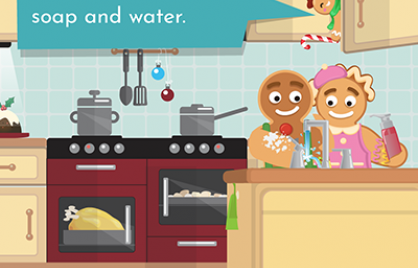Wednesday, January 30, 2019

This is a time of year when families and friends come together for fun.
The Centers for Disease Control and Prevention estimates that, each year, 48 million – or 1 in 6 – Americans get sick from a foodborne illness. Of those, 128,000 are hospitalized and 3,000 die. Follow these eight basic food safety steps to make sure you and your guests enjoy the festivities. Additional tips and other resources can be found at Foodsafety.gov.
- Wash your hands, not the turkey. Use soap and warm water to thoroughly wash your hands for at least 20 seconds before and after handling food. Take care to wash between your fingers, at the nail beds, and up your wrists. Wash your hands after handling raw meat or eggs, or unwashed vegetables. Hand sanitizer is not a substitute for hand washing. Do not wash your turkey before you prepare it. Doing so could spread harmful bacteria. Instead, pat it with paper towels and then throw the towels away.
- Keep foods separated. Raw foods should always be kept separate from ready-to-eat foods like produce. Store your holiday turkey at the bottom of your refrigerator on a plate or in a bowl to contain drippings. When preparing food, use separate cutting boards and plates for raw foods including vegetables. Wash utensils, cutting boards, and countertops with hot, soapy water.
- Safely thaw your frozen turkey. The best way to thaw a turkey is in a refrigerator. If your turkey is not thawed in time for cooking, microwave it or submerge it in cold water and continuously run cool water over the turkey, changing the water every 30 minutes, until it is fully thawed. Never thaw a turkey or any other food on the counter.
- Cook and reheat food thoroughly. Use a food thermometer to measure the temperature of a turkey at the thickest part of the bird to ensure that it has been cooked to the safe minimum internal temperature. Turkey should be cooked until the thermometer reads at least 165°F for 15 seconds. Do not rely on a pop-out thermometer in a turkey to indicate when it is safe to eat. The temperature of reheated food should also be measured with a food thermometer and read 165°F for 15 seconds.
Minimum Safe Internal Temperatures for Cooked Meats:
- 145°F for whole cuts of beef, pork, veal, and lamb
- 160°F for ground meats, such as beef and pork
- 165°F for all poultry, including ground chicken and turkey
- 165°F for leftovers and casseroles
- 145°F for fresh ham (raw)
- 145°F for fin fish or cook until flesh is opaque
- Avoid stuffing a turkey. Cooking stuffing in a casserole dish is the safest option, but if you choose to stuff your turkey, stuff the turkey immediately before cooking. Use a food thermometer to check the temperature of the turkey and the stuffing before removing it from the oven. The stuffing should reach 165°F. Wait twenty minutes after the turkey is finished cooking to remove the stuffing.
- Keep food out of the “Temperature Danger Zone.” Bacteria can grow rapidly between 41°F and 135°F. Cold foods like salads should be held at or below 41°F. After cooking, hot foods should be held at or above 135°F. When cooling foods, do so as quickly as possible by separating foods into smaller portions or using an ice bath. Cooling should take place within two hours of cooking, after which foods should be refrigerated immediately.
- Do not eat dough. Raw cake batter, cookie and pie dough can be tempting to eat, but don’t take the risk! Raw dough can contain harmful bacteria like E. coli and Salmonella. Do not allow children to eat or play with raw dough.
- Refrigerate leftovers. Once leftovers are cooled, store them in your refrigerator. Do not store stuffing inside a leftover turkey. Remove stuffing from the bird and put it in a separate container. Eat leftovers within 3 to 4 days. You can also store leftovers in the freezer for longer periods of time.
Keep Food Safe Links
This year, one in six Americans will get sick from food poisoning. Find out what you can do to keep you and your family safe.


